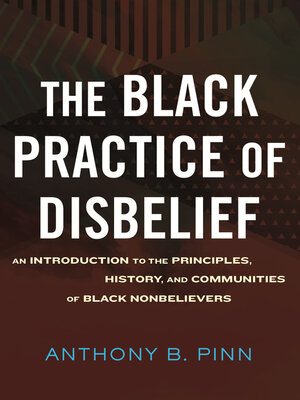The Black Practice of Disbelief
ebook ∣ An Introduction to the Principles, History, and Communities of Black Nonbelievers
By Anthony Pinn

Sign up to save your library
With an OverDrive account, you can save your favorite libraries for at-a-glance information about availability. Find out more about OverDrive accounts.
Find this title in Libby, the library reading app by OverDrive.



Search for a digital library with this title
Title found at these libraries:
| Library Name | Distance |
|---|---|
| Loading... |
A short introduction to Black Humanism: its history, its present, and the rich cultural sensibilities that infuse it
In the United States, to be a Black American is to be a Black Christian. And there’s something to this assumption in that the vast majority of African Americans are Christian. However, in recent years a growing number of African Americans have said they claim no particular religious affiliation—they are Black “nones.” And of these Black “nones,” the most public and vocal are those who claim to be humanists.
What does it mean to be a Black humanist? What do Black humanist believe, and what do they do? This slim volume answers these questions. Animated by 6 central principles, and discussed in terms of its history, practices, formations, and community rituals, this book argues that Black humanism can be understood as a religious movement. Pinn makes a distinction between theism and religion—which is simply a tool for examining, naming, and finding the meaning in human experience. Black humanism, based on this definition isn’t theistic but it is a religious system used to explore human experience and foster life meaning. It infuses humanism with rich cultural sensibilities drawn from Black experience. As shown in these pages, thinking about Black humanism this way frees readers from making unfounded assumptions and enables them to better appreciate the secular “beliefs,” ritual structures, and community formation constituted by Black humanists.
In the United States, to be a Black American is to be a Black Christian. And there’s something to this assumption in that the vast majority of African Americans are Christian. However, in recent years a growing number of African Americans have said they claim no particular religious affiliation—they are Black “nones.” And of these Black “nones,” the most public and vocal are those who claim to be humanists.
What does it mean to be a Black humanist? What do Black humanist believe, and what do they do? This slim volume answers these questions. Animated by 6 central principles, and discussed in terms of its history, practices, formations, and community rituals, this book argues that Black humanism can be understood as a religious movement. Pinn makes a distinction between theism and religion—which is simply a tool for examining, naming, and finding the meaning in human experience. Black humanism, based on this definition isn’t theistic but it is a religious system used to explore human experience and foster life meaning. It infuses humanism with rich cultural sensibilities drawn from Black experience. As shown in these pages, thinking about Black humanism this way frees readers from making unfounded assumptions and enables them to better appreciate the secular “beliefs,” ritual structures, and community formation constituted by Black humanists.







